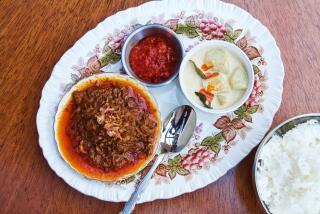It’s Tough Row to Hoe for Indonesia’s Nutmeg Isles
- Share via
RUN ISLAND, Indonesia — As nutmeg is sprinkled on eggnog and other Christmas confections this holiday season, it is harvest time in the only place in the world where the distinctive spice grows naturally.
Jutting out of the tropical sea, dotted with a few bamboo huts and free of traffic snarls or drug warfare, Run Island hardly seems a match for New York. But this speck of an island, one in eastern Indonesia’s Banda group, was once considered a fair swap for Manhattan.
The reason hits visitors in the nose immediately as they step onto the tiny island. They are wrapped in the warm scent of nutmeg, a venerable spice that once prompted early seafarers to genocide and earned them fortunes.
The brown seed of the nutmeg tree, caged in scarlet mace and prized as a delicious preservative for meats, was de rigueur in the world’s grandest kitchens in the days before refrigeration.
Portuguese explorers were first to discover the spice, finding the islands in 1599. Then the Netherlands launched a bloody campaign to wrest control.
The Dutch won, but killed the entire population of the main island, Banda Neira, in the process. Rusting cannons still litter the islands.
The Dutch sealed their monopoly in 1667 by handing over Manhattan to the British in exchange for total control of Run. They maintained their monopoly until an enterprising Englishman stole nutmeg seedlings during the Napoleonic wars and replanted them in Grenada and elsewhere.
The Bandanese say nutmeg needs volcanic soil, sea breeze and lots of shade. It is now grown elsewhere in Indonesia and the world, but Banda has a lock on quality, they say.
“It seems we’re the only ones who provide what it needs. The British stole our trees and planted them where they didn’t have those things and they got stunted,” said Bandanese Tanya Alwi, adding sadly that top quality is no guarantee of success.
“The world has grown used to second-quality nutmeg, those horrid little dry things from Grenada,” he said. “We’re too spicy.”
The alleged mismanagement of plantations and volcanic eruptions have devastated Banda’s crop. And in the cartel export system, based around the Indonesian Nutmeg Assn., known as Aspin, history repeats itself.
Now, say Aspin’s critics, it is not European merchants but a handful of wealthy exporters and a single Singapore-based trading firm that reap the rewards of local farmers’ labors.
Farmers in Banda have to turn their whole crop over to PT Perkebunan Pala Banda, a state company that sets the price and a production target. The company takes half the target amount for free and pays for the rest.
Pala Banda’s Haryanto, who oversees the husking and drying of the nutmeg on Banda Neira, says he pays 20 cents a pound for “wet” nutmeg.
Women crouch on the floor using knives, spoons and house keys to peel off the mace, itself a precious spice used in soup and baked goods. They earn about 1.4 cents per pound of peeled nutmeg. That is about 15 minutes of work.
Nutmeg’s domestic price, once it has been dried for 14 days in the tropical sunshine and shrunk to a quarter of its weight, is about 90 cents a pound.
By the time it reaches overseas customers--such as Coca-Cola, which uses it in its products--the price has risen to about $2.25 a pound, says exporter and former Aspin head Jantje Worotitjan.
Indonesia produces 75% to 80% of the world’s nutmeg.
Aspin insists that its sole export agent, First Pacific Commodities, a Singapore-based firm controlled by Indonesian businessman Ibrahim Risjad, is essential to maintain prices.
But Bandanese farmers say they would be better off if allowed to export directly themselves. And, they say, they deserve every advantage they can get.
Last year the volcano that rises out of the sea in the middle of the Bandas erupted, blowing hot ash to the other islands, especially Ai. That devastated the nutmeg trees and wiped out two years of production.
More to Read
Sign up for The Wild
We’ll help you find the best places to hike, bike and run, as well as the perfect silent spots for meditation and yoga.
You may occasionally receive promotional content from the Los Angeles Times.




